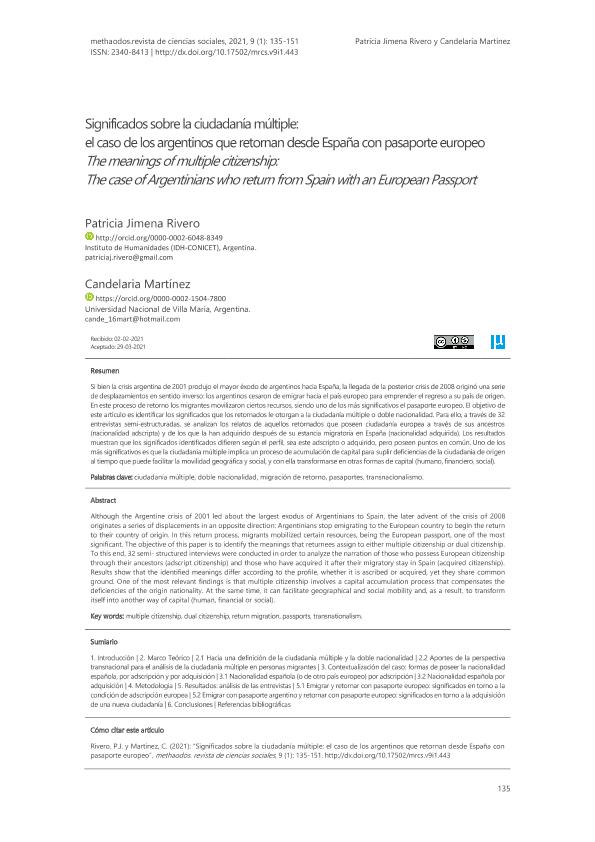Mostrar el registro sencillo del ítem
dc.contributor.author
Rivero, Patricia Jimena

dc.contributor.author
Martínez, María Candelaria
dc.date.available
2022-11-08T17:18:21Z
dc.date.issued
2021-05
dc.identifier.citation
Rivero, Patricia Jimena; Martínez, María Candelaria; Significados sobre la ciudadanía múltiple: El caso de los argentinos que retornan desde España con pasaporte europeo; Universidad Rey Juan Carlos de Madrid. Instituto de Estudios Sociales Computacionales; Methaodos; 9; 1; 5-2021; 135-151
dc.identifier.issn
2340-8413
dc.identifier.uri
http://hdl.handle.net/11336/176904
dc.description.abstract
Si bien la crisis argentina de 2001 produjo el mayor éxodo de argentinos hacia España, la llegada de la posterior crisis de 2008 originó una serie de desplazamientos en sentido inverso: los argentinos cesaron de emigrar hacia el país europeo para emprender el regreso a su país de origen. En este proceso de retorno los migrantes movilizaron ciertos recursos, siendo uno de los más significativos el pasaporte europeo. El objetivo de este artículo es identificar los significados que los retornados le otorgan a la ciudadanía múltiple o doble nacionalidad. Para ello, a través de 32 entrevistas semi-estructuradas, se analizan los relatos de aquellos retornados que poseen ciudadanía europea a través de sus ancestros (nacionalidad adscripta) y de los que la han adquirido después de su estancia migratoria en España (nacionalidad adquirida). Los resultados muestran que los significados identificados difieren según el perfil, sea éste adscripto o adquirido, pero poseen puntos en común. Uno de los más significativos es que la ciudadanía múltiple implica un proceso de acumulación de capital para suplir deficiencias de la ciudadanía de origen al tiempo que puede facilitar la movilidad geográfica y social, y con ella transformarse en otras formas de capital (humano, financiero, social).
dc.description.abstract
Although the Argentine crisis of 2001 led about the largest exodus of Argentinians to Spain, the later advent of the crisis of 2008 originates a series of displacements in an opposite direction: Argentinians stop emigrating to the European country to begin the return to their country of origin. In this return process, migrants mobilized certain resources, being the European passport, one of the most significant. The objective of this paper is to identify the meanings that returnees assign to either multiple citizenship or dual citizenship. To this end, 32 semistructured interviews were conducted in order to analyze the narration of those who possess European citizenship through their ancestors (adscript citizenship) and those who have acquired it after their migratory stay in Spain (acquired citizenship). Results show that the identified meanings differ according to the profile, whether it is ascribed or acquired, yet they share common ground. One of the most relevant findings is that multiple citizenship involves a capital accumulation process that compensates the deficiencies of the origin nationality. At the same time, it can facilitate geographical and social mobility and, as a result, to transform itself into another way of capital (human, financial or social).
dc.format
application/pdf
dc.language.iso
spa
dc.publisher
Universidad Rey Juan Carlos de Madrid. Instituto de Estudios Sociales Computacionales
dc.rights
info:eu-repo/semantics/openAccess
dc.rights.uri
https://creativecommons.org/licenses/by-nc/2.5/ar/
dc.subject
CIUDADANÍA MÚLTIPLE
dc.subject
DOBLE NACIONALIDAD
dc.subject
MIGRACIÓN DE RETORNO
dc.subject
TRANSNACIONALISMO
dc.subject.classification
Sociología

dc.subject.classification
Sociología

dc.subject.classification
CIENCIAS SOCIALES

dc.title
Significados sobre la ciudadanía múltiple: El caso de los argentinos que retornan desde España con pasaporte europeo
dc.title
The meanings of multiple citizenship: The case of Argentinians who return from Spain with an European Passport
dc.type
info:eu-repo/semantics/article
dc.type
info:ar-repo/semantics/artículo
dc.type
info:eu-repo/semantics/publishedVersion
dc.date.updated
2022-09-12T18:41:47Z
dc.journal.volume
9
dc.journal.number
1
dc.journal.pagination
135-151
dc.journal.pais
España

dc.journal.ciudad
Madrid
dc.description.fil
Fil: Rivero, Patricia Jimena. Consejo Nacional de Investigaciones Científicas y Técnicas. Centro Científico Tecnológico Conicet - Córdoba. Instituto de Humanidades. Universidad Nacional de Córdoba. Instituto de Humanidades; Argentina
dc.description.fil
Fil: Martínez, María Candelaria. Universidad Nacional de Villa María. Instituto Académico Pedagógico de Ciencias Sociales; Argentina
dc.journal.title
Methaodos
dc.relation.alternativeid
info:eu-repo/semantics/altIdentifier/url/https://www.methaodos.org/revista-methaodos/index.php/methaodos/article/view/443
dc.relation.alternativeid
info:eu-repo/semantics/altIdentifier/doi/https://doi.org/10.17502/mrcs.v9i1.443
Archivos asociados
